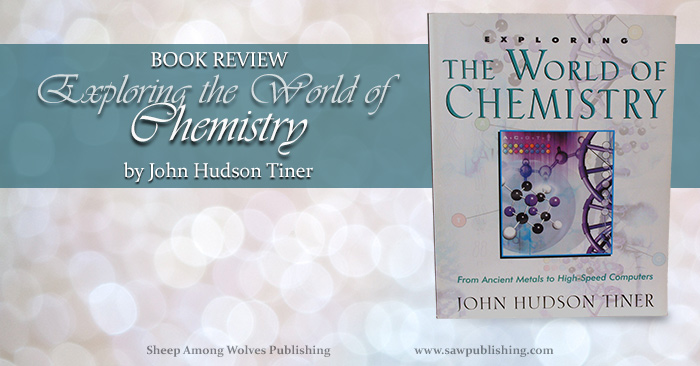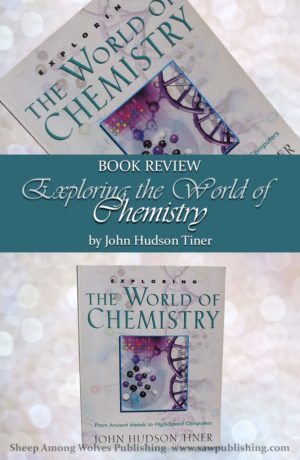Exploring the World of Chemistry—Book Review
 Exploring the World of Chemistry was a course I chose to take for the sake of my dad’s grandfather. Great Grandpa (who I had the incredible privilege of knowing during my childhood and early teens) was a passionate chemist. I took the course essentially so I could tell him I was taking it.
Exploring the World of Chemistry was a course I chose to take for the sake of my dad’s grandfather. Great Grandpa (who I had the incredible privilege of knowing during my childhood and early teens) was a passionate chemist. I took the course essentially so I could tell him I was taking it.
What I could never have predicted, was how much I would enjoy it for my own part. As some of you are aware, I am NOT a math and sciences person. When I studied science in high school, it was pretty much because I had to, and nothing more. Exploring the World of Chemistry was a different story. It remains, in my opinion, a shining example of how a subject can be covered in a way that will appeal to the very students who are most likely to dislike it.
 Book Details
Book Details
- Title: Exploring the World of Chemistry
- Author: John Hudson Tiner
- Publisher: Master Books
- Genre: Science/Textbook
- Number of Pages: 144
- Theme: The history of chemistry from a Biblical and creationist perspective
- Age Range: High School/General Audience
- Source: Master Books
Summary
Does chemistry have to be boring to students who don’t like science? Exploring the World of Chemistry attacks the subject from a new and unique viewpoint—teaching the basics of chemistry through the history of scientific discovery.
Beginning with the metallic elements familiar in the ancient world, John Hudson Tiner carries his readers along on a fascinating journey through the centuries of experiment, hypothesis, and exploration which have given birth to our modern understanding of the complex science of chemistry.
SAW Rating System
We have recently altered our reviewing system using the model of our poetry grading worksheet. For an explanation of the new system, see our introductory post.
Total Score—74/100
Great Qualities—37/50
Knowledgeability—8/10
Coverage of Topic—7/10
Quality of Writing—6/10
Impact of the book—8/10
Originality—8/10
Good Qualities—37/50
Innocence regarding evil—7/10
Active promotion of good—8/10
Level of spiritual challenge—6/10
Healthy view of life—7/10
Honouring God—9/10
Items of Note
-
Romance and morality
No issues.
-
Disturbing content
Fatal experiments/incidents are mentioned at various places throughout the book, but are handled without gratuitous detail.
Explosives and firearms are discussed in relation to their chemical causes.
-
Language
No issues.
-
Alcohol and drug use (includes tobacco)
Alcohol and medical drugs are mentioned in connection with their chemical composition and use in experiments.
“Intoxicating beverages” are referred to, but not so as to promote them.
-
Spiritual content
The book is written from a Biblical, creationist perspective, without any strong denominational bias. Bible incidents are used to illustrate chemical facts throughout the text.
Mythological deities are mentioned, chiefly in explaining name derivations.
One passage seems to imply, perhaps unintentionally, that the land of Egypt was exempt from the drought in the days of Joseph, due to irrigation from the Nile.
-
Family roles and behavior
No issues.
-
Mature subject matter
A few illustrations contain scantily clothed individuals.
The Reward of Exploring the World of Chemistry
I have always been very, very grateful that I chose to take Exploring the World of Chemistry when I did. My great-grandfather passed away the following year. I am so glad I was able to tell him that I had not only taken his favourite subject—but thoroughly enjoyed the course along the way.
Exploring the World of Chemistry is a book that opened my eyes to the possibilities which every subject holds to be made interesting and informative to a much wider audience than its “target demographic.” For a few more thoughts on this topic, see my previous post:

